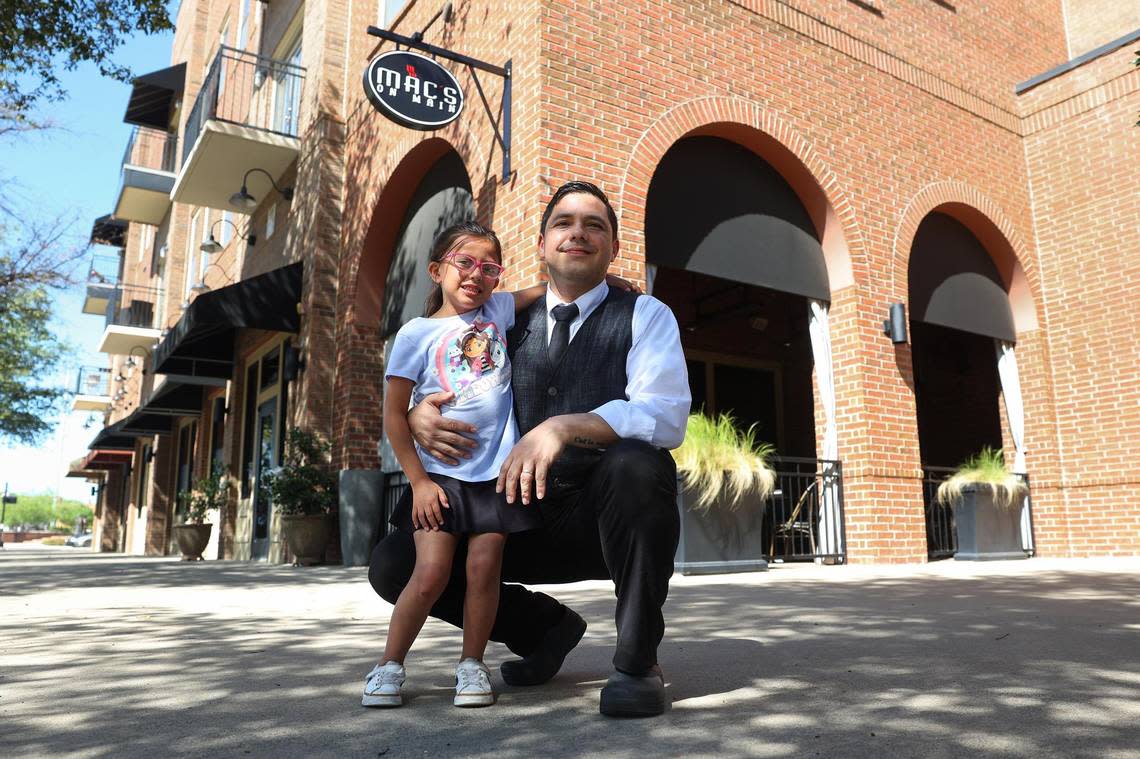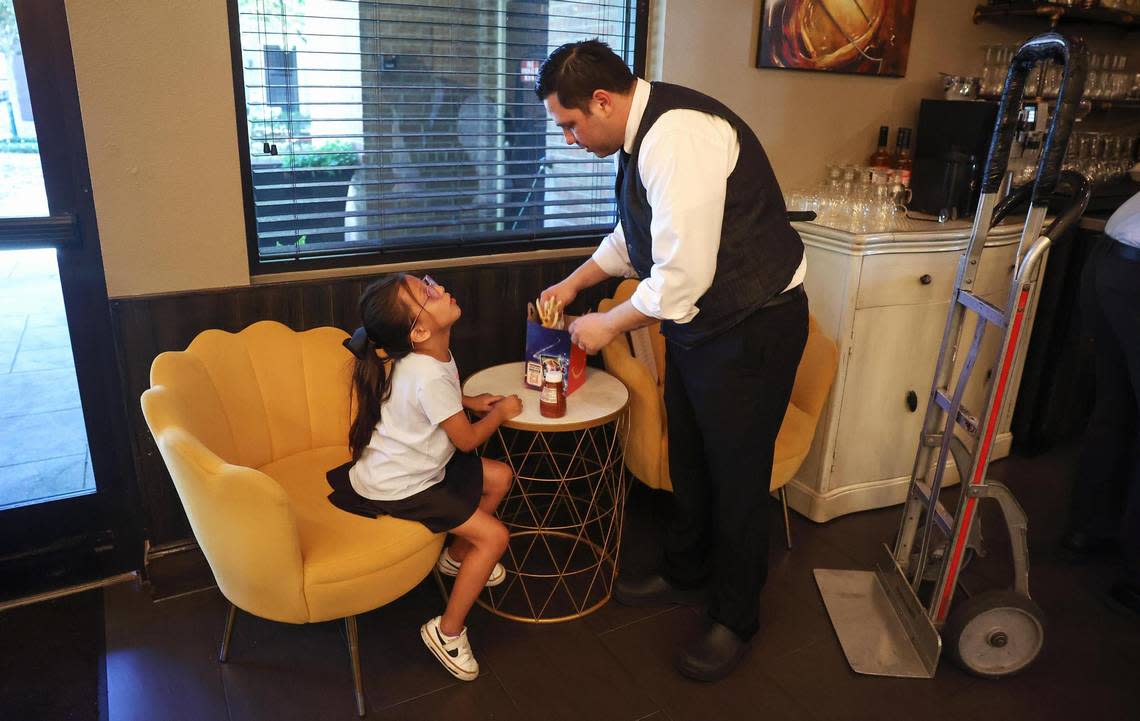A $9.4B loss: Texas restaurants, businesses pursue child care reform with economic lens
Child care providers, early educators and families navigating Texas’ child care system have been treading water for years. Now, private businesses are preparing to sound the alarm to legislators and plead for the rescue of a notable victim that’s bearing the weight of the issue: the state economy.
Restaurants, hotels, insurance companies and financial institutions are among more than 50 entities banding together alongside early childhood experts to advocate for child care policy reform during the upcoming 2025 legislative session. The various industries behind the Employers for Childcare Task Force say they are all enduring similar issues around employee turnover and understaffing that are directly tied to the lack of accessible, affordable and quality child care in the state. Simply put, parents can’t go to work if they are unable to find or afford care for their child, and Texas is estimated to be losing out on about $9.4 billion annually because of it, according to a recent study by the U.S. Chamber of Commerce Foundation.
The options for child care outside of volunteering family members, such as child care homes and centers, are costly at an average of $611 per month statewide. Additionally, the operating hours of these facilities typically align with a traditional 9-5 work day, which is not conducive for those who work as servers, nurses or hospitality workers.
Creating more opportunities for child care during nontraditional hours is among the focuses of the task force formed by the Texas Restaurant Association, Early Matters Texas, Texas Association of Business and Texas 2036, a nonprofit focused on finding nonpartisan policy solutions through data and research.
Kelsey Erickson Streufert, chief public affairs officer at the Texas Restaurant Association, said the task force is looking at other policies similar states have implemented, analyzing Texas’ current programs intended to assist families and providers to see how they can be improved, and simplifying red tape so providers can open or expand their services more efficiently.
She stressed there is no one-size-fits-all, silver bullet solution, which needs to be kept in mind when looking at long-term investments.
“I think the key for this task force is really going to be ‘What makes sense for Texas?’ We have to be realistic about our political landscape, about our budgetary landscape, about the fact that Texas is huge — so oftentimes these reforms are incredibly expensive in Texas just because of the sheer numbers,” Erickson Streufert said.
Today's top stories:
→ Rashee Rice, other driver face 8 criminal charges in Dallas car crash
→ Abandoned grain silos in Fort Worth catch fire
→ New taco restaurant brings original menu by standout chef
🚨Get free alerts when news breaks.
Early Matters Texas, a statewide coalition of organizations that focus on influencing state policies that support children from birth to third grade, is serving as a resource of knowledge to task force members who are learning about the ins and outs of the child care world before drafting specific legislative proposals. Executive Director Wendy Uptain said she’s never seen this degree of organized engagement on child care matters from the business community before.
“The idea of having the business leaders really engaged at the beginning of a policymaking process (for child care), I personally haven’t seen it at this level before where it’s a concerted effort,” Uptain said. “We’re definitely hitting on a nerve right now.”
Uptain points to the COVID-19 pandemic as a catalyst that brought this issue to the forefront as a focus on work-life balance gained momentum at the same time that existing gaps in the child care system were exacerbated.
“Employers are realizing, ‘It might be your personal choice to have a kid, but once your personal choice starts to impact your desire to come and work with me, or work in my company when I need you, your problem is now my problem. And I now need to solve it,’” Uptain said.

A bill proposed during last year’s legislative session called for the creation of an employer child care contribution program run by the Texas Workforce Commission that would have included matching of state dollars in partnerships where private and public dollars would have alleviated costs for families. It progressed halfway to becoming law before it died in committee, but Uptain said she wouldn’t be surprised if a similar proposal returned next session.
For employers such as Mike Coffey, president and founder of Fort Worth-based Imperative Information Group, improving the navigation process for existing state programs would be an initial step he would want to see taken before exploring potential partnerships either with the state or other employers like himself, he said. Coffey’s background investigations firm — a member of the Employers for Childcare Task Force — has 22 employees, and at least 60% of them are parents, he said.
His motivation to get involved in child care policy stems from his desire to better meet the needs of his employees, he said. Coffey, who is also the North Texas Regional Chair of the Texas Association of Business, noted that the majority of businesses in the state are small businesses — a statistic that should be considered when digging into child care policy strategies. Tapping into resources for a smaller operation can be a greater challenge compared to corporations, he said. Still, finding solutions is crucial in order to set up the next generation of business leaders for success.
“The business case is: If you want to attract and retain the best talent that you can get, you’ve got to meet them where their needs are, to the extent that you can afford to do it,” he said. “If half or three-quarters or most of your income goes to child care, then why participate in the workforce?”
Restaurants notably affected
Erickson Streufert, of the Texas Restaurant Association, highlighted that although most industries are grappling with child care obstacles, the food service industry is taking a particularly harsh hit.
The industry recently surpassed the healthcare industry as Texas’ largest private sector employer, encompassing 11% of the state’s workforce with more than $1.2 million Texans. Juan Cordova, a server and bartender at Mac’s on Main restaurant in Grapevine, is among the workers powering this major economic engine while also juggling child care obstacles as a father of two daughters who are ages 14 and 6.
Cordova’s employment in the industry predates the births of his daughters, as he’s been working in the sector for 22 years, he said. His older daughter, Chloe, was enrolled at La Petite Academy in Bedford until she aged out of the program at 12 years old.
His younger daughter, Camila, also attended the child care center for about 3½ years but left after Cordova and his family no longer qualified for a scholarship through Child Care Management Services. The full price of child care became too expensive without the financial aid, Cordova said, and now he and his wife — who is also a server — work opposite shifts and rely on family members to make their child care situation work.
“If you do the math, it’s like you go to work just to pay for the child care (and) for your kid to be taken care of by someone while you’re at work,” Cordova said of paying full price. “It’s just basically pointless.”
The constant balancing act between work and child care has put a strain on Cordova’s marriage and family, as one of the only times the whole family can spend together is during holidays, he said. Beyond improving the general infrastructure of the child care industry, Cordova wants to see early educators receive a pay raise for working in a critical caregiver role comparable to a third parent. The average wage for early educators in Texas is $12 per hour.

“Like they say, it takes a village to raise a kid, and it definitely takes child care in this time and age for us to be able to be successful parents,” Cordova said.
Cordova’s boss, Rena Frost, concurs as a mother, former employee and current employer. The owner of Mac’s on Main in Grapevine and Mac’s Bar & Grill in Arlington said she recently lost a management staff member who is now a stay-at-home dad due to child care obstacles. Through the task force, she wants to be able to pass along resources and information to her employees more effectively.
“I need to find a way to keep them that works for them and their family. I think that’s important,” Frost said.
Overall, it’s important for the food service industry to thrive and pave the way to hire more workers through child care access because it’s a major part of the food chain and food delivery system feeding the state of Texas, which didn’t freeze when COVID-19 hit, she said. Restaurants are also largely tied to state tourism.
“It’s not just people in our industry that should be concerned about whether or not we figure this problem out, especially with hospitality workers — it’s everyone,” Frost said. “Because we’re a lot. We’re a lot of the dollars generated.”
Will child care policy capture attention of lawmakers?
A policy brief published last month by the University of Texas at Austin’s LBJ Urban Lab — a research entity within the university’s School of Public Affairs that focuses on urban policy — lays out proposals for state lawmakers to address child care gaps as “the need for action is more urgent than ever,” researchers state.
The last round of federal stimulus funding, consisting of a multi-billion-dollar investment issued in response to the COVID-19 pandemic through the American Rescue Plan Act, expired at the end of September. The Texas Workforce Commission extended this deadline through the end of November with an additional $1 billion in stimulus funding.
In the months following the cut-off of this funding, child care providers have been forced to close their doors. A recent survey published by the National Association for the Education of Young Children shows that 58% of early educators in Texas reported that at least one child care program has closed in their community over the last year. Additionally, more than half of directors and operators statewide say they are experiencing a staffing shortage, dealing with under-enrollment, and raising tuition for families.
Leaders of the association and UT Austin researchers are calling for public investments to be made.

“The implementation of legislation in other states and cities across the nation provides a solid starting blueprint. It’s Texas’s turn to establish child care support policies that will help grow the state’s economy and support Texas families now and in the future,” the UT Austin policy brief states.
The brief identifies four areas of policy that researchers consider to be priorities:
Economic incentives for providers such as low-interest loans
A streamlined Texas Rising Star accreditation process to improve the existing program designed to help providers improve their quality of care and expand their services
An employer child care assistance program to help businesses retain their employees and increase affordability of care
Innovative local solutions tailored to a community and the needs of its working families
With the 2025 legislative session less than a year away, it remains to be seen if Democrats and Republicans will find common ground on policy decisions. For Steven Pedigo, a professor and director of the LBJ Urban Lab who co-authored the brief, child care is a “highly bipartisan issue” that impacts all types of families.
“You get the economic development argument that may kind of resonate with kind of fiscal conservative types… Whereas, if we frame the issue as it relates to child care from an early education issue, you may get maybe some of the progressive folks around that work,” Pedigo said.
Although a $2.3-billion House proposal for child care was not included in the state’s finalized budget for 2024-25 — amid a $30 billion surplus — a bright spot for the child care sector came with the passage of Proposition 2 in November. Almost 65% of Texas voters voted in favor of the constitutional amendment allowing local governments to provide property tax exemptions to certain child care facilities.
The Fort Worth City Council plans to discuss possible utilization of this policy at the local level next month, which could impact nearly 70 child care providers serving approximately 5,500 children in the city, according to spokesperson Bethany Warner. Mayor Mattie Parker voiced support of Proposition 2 when it was approved by voters and has been an advocate for early education solutions and partnerships.
For the Tarrant County Commissioners Court, the current budget development process for fiscal year 2025 will include consideration of a property tax exemption for child care facilities, according to spokesperson Bill Hanna. Judge Tim O’Hare did not respond to a request for comment.
State Rep. Mihaela Plesa, a Plano Democrat on the International Relations & Economic Development Committee that oversees the Texas Workforce Commission, thinks Proposition 2 will set the stage for additional child care and early education reforms when the legislature reconvenes. Plesa is excited to see that businesses are coming to the table on the issue.
“When I look at employers creating some kind of child care contribution, or doing some kind of public-private partnership, I think that is going to move Texas forward,” Plesa said. “It’s about time that everyone got on board about this issue because we’ve been talking about child care in Texas for a really long time. I’ve been working in the legislature for seven years and ever since my very first session as a staffer, we were talking about child care.”
The Star-Telegram reached out to Sen. Phil King, a Republican from Weatherford who is a small business owner and member of the Senate Education Committee, and Sen. Brian Birdwell, a Republican from Granbury who is also a member of the Education Committee and chair of the Natural Resources & Economic Development Committee. Neither responded to requests for comment.
